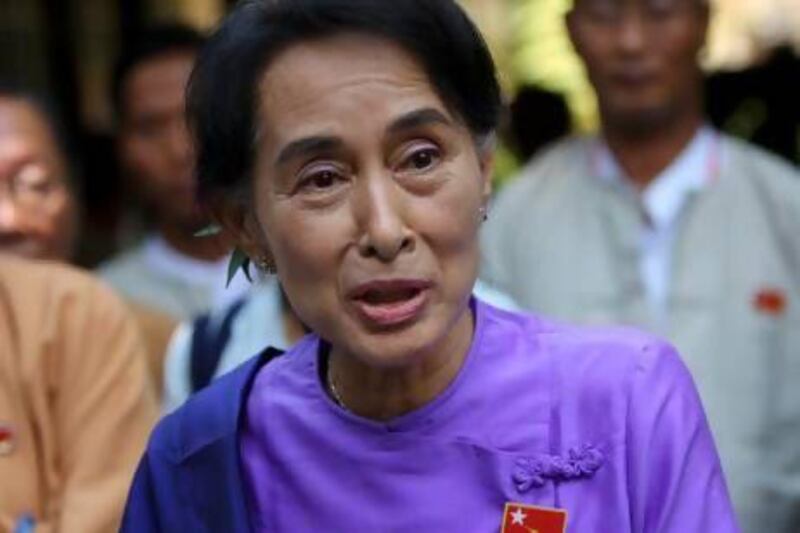YANGON // Bo Kyi, a dissident who spent eight years in one of Myanmar's most notorious prisons, is visibly uncomfortably when asked about the country's iconic opposition leader, Aung San Suu Kyi.
He chooses his words carefully: "She is very silent on many issues. We understand her strategy for the time being, but she needs to start showing some progress soon."
It is with great reluctance that some of the country's most prominent activists have started to question the leadership of Ms Suu Kyi, who was selected on yesterday to continue as leader of her National League for Democracy (NLD) party.
For a quarter of a century, Myanmar's activists invested almost all their hopes for political freedom and an end to military rule in the 67-year-old Nobel laureate but, for most of those years, she was hidden away under house arrest. So rarely was she allowed to address her followers that a single blurry photo of her meeting protesters at the gate of her home during the failed uprising of students and monks in 2007 was considered a momentous event.
Today, her image is everywhere - on mugs and posters and T-shirts, and the front pages of newly-uncensored newspapers. As part of the sweeping democratic reforms under the new quasi-civilian government of president Thein Sein, she has been released from detention and taken a seat in parliament through by-elections last April. At the weekend, the NLD held its first conference since she helped found the party in 1988.
But as the initial euphoria of the country's political changes has subsided, difficult questions have emerged about Ms Suu Kyi's silence on key issues and the failure to promote alternative leaders within the NLD.
"She needs to strengthen her party - at the moment it is all about her," said Bo Kyi who, as joint director of the Assistance Association for Political Prisoners, helped lead the campaign to release victims of the previous military regime. "She thinks she is already the saviour of human rights, but if she wants to take on the Burmese government, she cannot do it solo."
Already, divisions have appeared in the NLD. Ahead of the convention, four candidates for central committee seats were barred from attending on the grounds that they had "aimed to destroy the party's unity." No further explanation was given. One of the candidates accused party leaders of "acting like a military junta."
But it is Ms Suu Kyi's failure to criticise the government for continuing human rights violations that has disappointed activists the most.
She rarely comments on the continuing war in northern Kachin state, where 100,000 civilians have been displaced amid an unprecedented onslaught by the Myanmar army, beyond calls for both sides to "negotiate". Nor has she devoted time to the suffering of the blighted Rohingya Muslims in the south-western state of Arakan, who are denied citizenship and have born the brunt of brutal communal riots in the past year that have claimed over 1,000 lives.
"Her focus is collecting awards and becoming president," said Khon Ja, of the Kachin Peace Network. "We have been asking to meet her for over a year, but she never agrees to meet any of us."
In a country that revels in political rumour, many suspect a back-room deal between Ms Suu Kyi and the ex-military rulers to curb more strident criticisms while they continue the tentative steps towards reform and prepare for elections in 2015.
"I suspect she has some kind of working agreement with the parliamentary speaker Shwe Mann," said one western diplomat on condition of anonymity. "They have common ground in wanting to see a more powerful parliament. She sees it as the best way to establish democracy. But they have to move slowly to keep some of the older guys on side."
One of the greatest challenges will be changing the 2008 constitution, which guarantees a military stranglehold on parliament and bars Ms Suu Kyi from the presidency on the grounds that she married a foreigner.
But a more fundamental challenge lies in the lack of capacity across every level of public life. A culture of silence and fear and an abysmal education system means few have the skills to govern.
"We are worried about the NLD coming to power. They are very popular and will win the election, but they don't have experience of running a government," said Min Yan Naing, director of the Generation Wave Institute, a group of former activists which recently started training programmes in political science and management for future leaders.
"If they are not effective in the five years after 2015, the USDP [the military-backed party that currently dominates parliament] will get back to power because they have 30 or 40 years of experience. That is what happened in Indonesia and it could happen here."
For now, the doubts around Ms Suu Kyi and her party exist only among an educated elite. For many millions, she remains a symbol of hope and freedom after five decades of repression. They have no qualms about the cult of personality that has evolved around her.
"This is an amazing thing to see," said Nyi Nyi Lwin, a 35-year-old NLD volunteer waiting outside the party convention this weekend. "We never thought our party would be able to hold a conference.
"The country has many problems - they cannot be solved in one day. She has a long-term plan and we want her to be president. She has two sons, and we want them to be our leaders one day, too."
foreign.desk@thenational.ae





